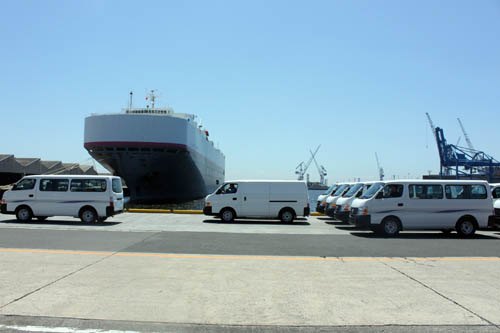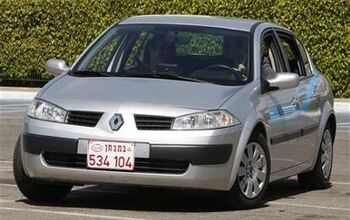Nissan To Reduce Exports From Japan

Following strong rhetoric of Japan’s automakers against the strong yen, Nissan appears to take action. According to Reuters, Nissan will “reduce exports by as much as a third and reduce the impact of the yen’s crippling strength.” The move is couched into socially acceptable terms.
According to the Reuters report, Nissan does not want to reduce its Japanese production level. The company repeatedly had committed to producing 1 million cars in Japan. Reuters quotes Nissan’s Executive Vice President Hiroto Saikawa who said that the plan is to sell more cars in Japan. By increasing sales in Japan and building more vehicles for other brands under OEM agreements, “Nissan aims to boost production of vehicles sold locally in Japan from 460,000 vehicles last year to 600,000,” the report says. This would reduce exported vehicles to 40 percent, down from 670,957 units or 59 percent last year. It also would increase Nissan’s bottom line. With the yen trading at 80 to the dollar or below, exporting cars from Japan means incurring losses.
Nissan’s global production number was nearly 4 million in 2010. Only a quarter of this was made in Japan. Nissan had likewise indicated in the past that most or all of its future volume growth would go on account of locations outside of Japan.
Disclaimer: There is no official announcement by Nissan to this effect. Although Sunday is now a normal working day in the Japanese auto industry, I was unable to reach anyone at Nissan to receive independent confirmation. Emails have been sent. However, the report is by Ran Kim, an extremely reliable and conscientious Reuters correspondent.

Bertel Schmitt comes back to journalism after taking a 35 year break in advertising and marketing. He ran and owned advertising agencies in Duesseldorf, Germany, and New York City. Volkswagen A.G. was Bertel's most important corporate account. Schmitt's advertising and marketing career touched many corners of the industry with a special focus on automotive products and services. Since 2004, he lives in Japan and China with his wife <a href="http://www.tomokoandbertel.com"> Tomoko </a>. Bertel Schmitt is a founding board member of the <a href="http://www.offshoresuperseries.com"> Offshore Super Series </a>, an American offshore powerboat racing organization. He is co-owner of the racing team Typhoon.
More by Bertel Schmitt


































Comments
Join the conversation
The non UAW automakers have a huge advantage. They can distribute manufacturing across the globe in order to stay competitive. GM, Ford, and Chrysler are strung with UAW contracts that leave them at risk to changing financial markets not to mention the inability to obtain lower global labor costs. There is no way Detroit can compete in such a world. They will need more and more US government support. Isn't socialism wonderful?
I read the Reuters spot, but only got this, 1) gonna increase our brand and non-brand market penetration, and 2) we are gonna reduce our export ratio. I understand the curreny-driven scenario, and while I agree it may well be the motivator here, is it not also possible that pt 1) could have been a plan also to increase capacity-utilization, and that pt 2 then follows? The production-target commitment must have been in response to some criticism (likely of either producing too few of its total number in Japan, or of increasing foreign-produced quantities into Japan, or somebody pointing out excess capacity and too little ROA on japanese production assets. (Maybe Bertel knows which.) My knowledge is a little dated, but Nissan was never much of a private-label manufacturer; Suzuki was the undisputed KING of this (IIRC these offerings were exclusively for the Kei-segment). As of ca. 2005, IIRC, Nissan's sole offering other OEMS was a non-Kei mid-sized station wagon intended for courier or trade use. If Nissan is developing its own Kei car, and if it is a competitive one, then Suzuki will for sure feel the heat. In terms of exchange rate-policy, I wonder if much will happen before Toyota makes a similar announcement... or before the japanese OEMS (other than Honda shipping to Europe) start shipping en-masse from China... BTW: 1. Late last week, the BOJ (the Swiss Nationalbank independently did too) took actions to try and weaken the JPY and (CHF), it will be interesting to see how this delays, or affects, similar announcements regarding re-balancing production to ex-jpn facilities (we may never know however); 2. I also wonder how this announcement squares with the recent artice here on TTAC, that the japanese OEMS were having trouble ramping up production because they can not find enough workers? (Such a situation could cause one to do more localized production too.)